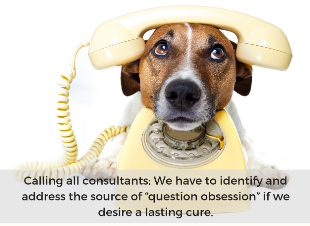This post is part of our Weekly Tips series.
 There’s a long-standing epidemic that extends to just about anyone who has attended consulting skills training. You might even be asymptomatic—in other words, you don’t realize you’re suffering. Read on to find out what it is and what to do about it.
There’s a long-standing epidemic that extends to just about anyone who has attended consulting skills training. You might even be asymptomatic—in other words, you don’t realize you’re suffering. Read on to find out what it is and what to do about it.
The problem, as was recently identified by Charlie Green on the TrustMatters blog, is question obsession.
He rightly called it the consultant’s nemesis, and suggested it grows out of a belief that the key to most things we value in our client relationships (like creating value for them, and selling them more stuff so we can create more value) is to ask the right questions at the right times. Charlie even found a sales website with a list of sales questions along with the following claim: “Get the answers to these questions, and take action based on those answers, and you’ll get the sale. It’s that simple.”
We all know better. It’s not that simple. Good questions, while necessary, are far from sufficient.
Charlie asserts that question obsession naturally leads to obsession with our own products, solutions, cleverness—all of which rhyme with high self-orientation. True, that. My addition: We have to identify and address the source of this obsession if we desire a lasting cure.
Question obsession is, simply put, a byproduct of fear. We fear uncertainty, rejection, embarrassment, and more. So, we attempt to control conversations to mitigate our perceived risk, and we use questions as our tool.
The solution. Charlie’s antidote (rightly again) is to focus more on how you ask critical kinds of questions—those that create insight, improve the relationship, and empower your client. In addition to that, I suggest a tactical shift you can make in your conversations—as soon as today—to steer yourself away from asking so many questions in the first place.
Let’s review seven alternatives to questions that should be a regular part of your listening toolkit. This time they’re in order of least to most risky:
- “Tell me more.” This statement is a great way to give others all kinds of freedom to say what they want to say (which of course is why it’s risky). You’ll notice it’s not “Tell me more about …,” it’s the less directive, “Tell me more.”
- Paraphrasing. “So what I hear you saying is …” It’s such a simple way for people to feel heard—and for them to hear themselves. The risk is your own perception that you’re not adding value. Note the difference between perception and reality. Just the other day I was in a workshop with the clients of people I had previously trained, one of whom felt compelled to speak up about how immensely valuable it is to him when he’s on the receiving end of this simple practice.
- Empathizing. “That sounds stressful.” The risk here is that you’re actually attending to your client’s emotional state (yikes!). And you might do it wrong—e.g., mirror back stress when, in fact, they’re annoyed. (To which I say, congrats, you’re on your way to really understanding them.)
- Audible pauses. These include un-hunh, mhmm, hmmm. I know, these seem laughable when you read them. Don’t dismiss audible pauses too quickly. They can be big conversation encouragers when they’re genuine and natural. The risk of using them is missing an opportunity to look smart, “add value,” etc.
- Non-verbals. Non-verbals include pace, pitch, volume, and tone (all of which can be gauged over the phone, and even sometimes through email) as well as body language like gestures and posture. All of these communicate, “I’m open, and I’m listening.” Note perceived risks in #4 above.
- Saying nothing. Silence is usually awkard for the listener. It can be a welcome respite for the listen-ee. Manage yourself in such a way that you don‘t give into the need most of us feel to fill every single moment of the conversation with something. Taking a few deep breaths usually helps.
- “I‘m not sure what to say.” This one’s the riskiest for those who have been trained that it’s an act of consulting treason to be unsure what to say, let alone admit it. If you‘re stumped and don‘t know what to say next—either because they‘ve just opened up in an unexpected way, or because you can‘t figure out how not to ask a (premature) question, it‘s ok to say just that.
I’m not saying kill all questions. The right question at the right time for the right reasons can be a stroke of brilliance that truly helps your client. I’m saying nip the obsession at the source. Most of us simply aren’t discerning enough because we aren’t that self-aware. We’ve got Big S Question Obsession Syndrome and don’t even know it.
Make It Real
This week, review the list above and pick out the ones that make you the most uncomfortable. Then bring them to your conversations.
Learn More

Read the oldie but oh-so-goodie, “The Point of Listening is Not What You Hear, but the Listening Itself,” from our friends at Trusted Advisor Associates, or remember why it’s not enough to be right in Chapter 6 of The Trusted Advisor Fieldbook.
Andrea Howe
Latest posts by Andrea Howe (see all)
- A lesson from my own trust “fail” in my first-ever client meeting - April 15, 2024
- Why choosing silence in the face of awkwardness can be a trust tragedy - March 21, 2024
- What NOT to do when you think you’re being ghosted - February 21, 2024
